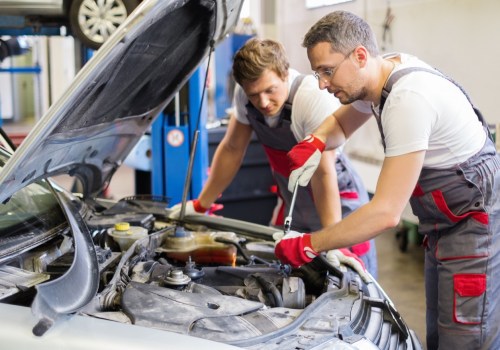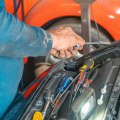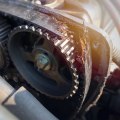The most common exhaust system problems, such as a faulty oxygen sensor, exhaust leaks, exhaust smoke, rust, broken hooks, vibrations, and engine growth. In this blog, our expert technicians at Christian Brothers Automotive discuss the most common problems with exhaust systems, such as a faulty oxygen sensor, exhaust leaks, exhaust smoke, rust, broken hooks, vibrations and increased engine noise, as well as what you can do about it and how you can prevent them from happening to your own vehicle. Tackle rust and corrosion Regular inspections are essential to detect rust early. Washing the underside of the car, especially after driving in wet or snowy conditions, can help prevent moisture build-up.
Correct exhaust leaks If you suspect a leak, don't ignore it. A professional inspection can locate and seal the problem before it becomes a major problem. Although many drivers take this for granted, the exhaust system plays a vital role in the overall health and performance of your car. The exhaust system is a complex network of interconnected parts, including the exhaust manifold, oxygen sensors, catalyst, exhaust pipe, muffler and, in some models, a resonator.
Each part plays a vital role. All of them must work together harmoniously to effectively manage exhaust gases; if any part malfunctions, the entire system is jeopardized. When the car's engine ignites the fuel-air mixture inside the combustion chamber, a powerful explosion occurs, propelling the vehicle forward. However, this process also produces a mixture of harmful gases that are dangerous if inhaled for too long.
This is where the exhaust system comes into play. As the engine pumps these gases, the exhaust manifold collects them from each cylinder and directs them to a single pipe. From there, gases flow through the catalyst, which contains special catalysts that help convert harmful emissions into less toxic substances. The gases then pass through the resonator, helping to reduce engine noise and vibrations.
Finally, the gases enter the silencer, where they are dispersed and expelled through the exhaust pipe. Most importantly, an exhaust leak means that harmful gases are not properly expelled from the car's exhaust system. This can cause higher engine temperatures, which can lead to higher fuel consumption. In some cases, exhaust gases can also seep into the cabin, so if you notice a decrease in your gas consumption without an obvious cause, it's essential that you inspect your vehicle as soon as possible.
If you notice unusual or excessive vibrations in the steering wheel, accelerator, or seat, it's likely due to a problem with the exhaust system. A common culprit is a rusty exhaust pipe, something often seen in vehicles that are primarily used for short trips. When you take short trips, the muffler and exhaust pipe don't get hot enough to evaporate the moisture that builds up in the system. Condensation will settle in the system and, over time, may cause corrosion.
Another common reason for excessive vibrations is exhaust leaks. In either case, it's important to inspect and repair the system promptly to avoid more costly repairs or safety issues. When it comes to engine noise, there are several possible causes, but a common cause is usually a leak in the exhaust system. If you hear a loud noise in the engine that goes up and down with the revolutions of the vehicle, it's a clear indication that there is likely to be a leak in the exhaust manifold or in one of the gaskets of the escape.
Once again, it's important to address exhaust leaks promptly to avoid risks to your health and that of your passengers. Another type of noise that can indicate exhaust problems is a whistle or a click while the engine is running. These sounds may indicate an obstruction in the exhaust system, causing abnormally high backpressure. If you hear whistles or clicks, it's important to pay attention to other signs of problems, such as discolored and burned wires or spark plug boots or burnt paint near the exhaust holes in the cylinder head.
Another odor that indicates a problem in the exhaust system is the smell of gasoline inside the car. When one of the exhaust pipes is damaged and leaking, gas vapors, along with other exhaust gases, escape through the opening. These harmful gases can then enter the cabin, where you and your passengers can inhale them. Because of safety risks, gas odors should never be ignored; schedule an appointment so that the problem be addressed immediately.
When there's a problem with the exhaust system, you're likely to notice an impact on the vehicle's performance. One of the most common causes of performance problems is a problem with the catalyst, which can cause difficulties during start-up and a decrease in acceleration power. Exhaust leaks can also contribute to performance problems, as they interrupt the proper flow of exhaust gases and affect overall engine efficiency and performance. Schedule an exhaust system overhaul today and let the ASE-certified technicians at Christian Brothers Automotive take care of you.











